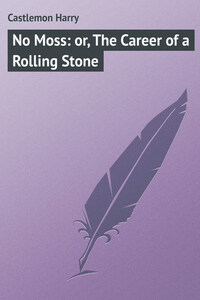CHAPTER I
RODNEY KEEPS HIS PROMISE
"So you are going to stick to your uniform, are you? I thought perhaps you would be glad to see yourself in citizen's clothes once more, and so I told Jane to put one of your old suits on the bed where you would be sure to see it."
It was Mrs. Gray who spoke, and her words were addressed to her son Rodney, who just then stepped out of the hall upon the wide gallery where his father and mother were sitting. Rodney had been at home about half an hour just long enough, in fact, to take a good wash and exchange his fatigue suit for a sergeant's full uniform.
In the first volume of this series of books we told of the attentions our Union hero, Marcy Gray, received while he was on the way to his home in North Carolina, and how very distasteful and annoying they were to him. We said that the passengers on his train took him for just what he wasn't – a rebel soldier fresh from the seat of war, or a recruit on his way to join some Southern regiment – and praised and petted him accordingly. Marcy didn't dare tell the excited men around him that he was strong for the Union, that he had refused to cheer the Stars and Bars when they were hoisted on the tower of the Barrington Military Academy, and that if a war came he hoped the secessionists would be thrashed until they were brought to their senses – Marcy did not dare give utterance to these sentiments, for fear that some of the half tipsy passengers in his car might use upon him the revolvers they flourished about so recklessly. He was obliged to sail under false colors until he reached Boydtown in his native State, where Morris, his mother's coachman, was waiting for him. Rodney Gray, the rebel, who you will remember left the academy a few weeks before Marcy did, received just as much attention during his homeward journey. Sumter had not yet been fired upon, but the passengers on the train were pretty certain it was going to be, and gave it as their opinion that if the "Lincolnites" attempted "subjugation" they would be neatly whipped for their pains. Being in full sympathy with the passengers Rodney was not afraid to tell who and what he was.
"I am neither a soldier nor a recruit," he said over and over again, when some enthusiastic rebel shook him by the hand and praised him for so promptly responding to the President's call for volunteers. "I am a Barrington cadet on my way home, and I am under promise to enlist inside of twenty-four hours after I get there. Do you see this gray suit? I shall not wear any other color until the independence of the Southern States has been acknowledged by the world."
Such sentiments as these never failed to "bring down the car," as Rodney afterward expressed it when describing some of the incidents of his journey from Barrington, and many of the passengers assured him that he would be at liberty to put on a citizen's suit in less than six months.
"The fighting won't amount to anything," said one, who talked as if he thought himself able to whip the whole Yankee nation alone and unaided. "It will be over in a good deal less than six months, but you gallant fellows will have to wear your uniforms a little longer in order to escort President Davis to Washington. He will dictate terms of peace in the enemy's capital."
"If our President will only do that, I will stay in the army ten years if it is necessary," declared Rodney, and he meant every word of it, for he was carried away by his enthusiasm.
A good many foolish notions of this sort were drummed into Rodney Gray's head during his two days' journey from Barrington to Mooreville. He afterward had occasion to recall some of them, and to wonder how he ever came to accept them as the truth. But he kept his word so far as his uniform was concerned; that is to say, he returned to the closet the citizen's suit that had been laid out for him, and rigged himself up as if he were going on dress parade. His mother looked at him with fond and admiring eyes as he stepped upon the gallery and seated himself in the easy chair that one of the attentive darkies placed for him; for Rodney was an only child, and a very fine looking young soldier besides.
"Yes," he said, in reply to his mother's question. "I am going to stick to my uniform. It is the color that has been adopted by our government, and, as I told some of the passengers on the train, I'll not wear any other until we have secured our independence."
"Nobly said!" exclaimed Rodney's mother, who was as strong for secession as Marcy Gray's mother was for the Union. "I was sure you would not stay at home very long after your State called for your services. I don't think you will have to wear the gray for a very great while, but your father thinks he sees trouble in the near future."
"I don't think so my dear; I know so," replied Mr. Gray, in answer to an inquiring look from Rodney. "The North can raise more men than we can."
"That was what the colonel said when I asked him to let me come home," exclaimed Rodney. "He said, further, that the Northern people are not cowardly – they are only patient; and that there will come a time when their patience will all be gone, and then they will sweep over us like a cloud of locusts."














